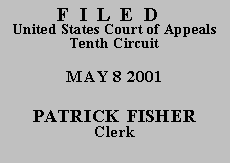

| OLAF PETER JUDA, | |
| Plaintiff - Appellant, | |
| v. | |
| DENNIS MICHAEL NERNEY, Assistant U.S. Attorney, Northern District of California; STEPHEN R. KOTZ, Assistant U.S. Attorney, Albuquerque, NM; JOHN J. KELLY, U.S. Attorney, Albuquerque, NM; MICHAEL YAMAGUCHI, U.S. Attorney, San Francisco, CA; ROBERT L. HOLLER, District Director, U.S. Customs Service, El Paso, Texas; LEONARD S. WALTON, Acting Assistant Commissioner, U.S. Customs Service, Washington, DC; BONNIE L. GAY, FOIA Unit, Attorney in Charge, Washington, DC; JOHN/JANE DOE, 1-25; and UNITED STATES OF AMERICA, |
|
| Defendants - Appellees. |
Appellant, proceeding pro se, appeals the district court's decision that equitable tolling of the statute of limitations permits the government to proceed in a judicial forfeiture action against Appellant's personal property. In Juda v. Nerney, No. 99-2070, 2000 WL 419823 (10th Cir. Apr. 17, 2000), we held that the government must return to Appellant items of his personal property or their monetary equivalents unless "the government has a valid argument against the operation of the statute of limitations." Id. at *3. Upon remand for such a determination, the magistrate judge concluded that equitable tolling principles should apply in this case, citing United States v. $57,960 in U.S. Currency, 58 F. Supp. 2d 660 (D.S.C. 1999), for support. Record, Doc. 59, at 7-9. The magistrate judge recommended that the statute of limitations on bringing a forfeiture action be tolled from October 27, 1991, until April 17, 2000, with respect to all items of Appellant's personal property and jewelry. See id. at 10. The district court adopted the magistrate judge's analysis and recommendations. Record, Doc. 68. After reviewing the analysis of the magistrate judge and the decision of the district court, we AFFIRM for the reasons given in those opinions.
Entered for the Court
Monroe G. McKay
Circuit Judge
*. This order and judgment is not binding precedent, except under the doctrines of law of the case, res judicata, and collateral estoppel. The court generally disfavors the citation of orders and judgments; nevertheless, an order and judgment may be cited under the terms and conditions of 10th Cir. R. 36.3.